- Home
- Juliet Marillier
Seer of Sevenwaters Page 19
Seer of Sevenwaters Read online
Page 19
There was a small island of quiet where my family sat. Cathal appeared to have finished his breakfast; Clodagh had barely touched hers. He looked as if his mind was elsewhere. She was pale. Gareth and Johnny conversed in murmurs, their attention only on each other. Sam and Brenna were eating their porridge in the purposeful manner of folk who have a full day’s work ahead of them.
I seated myself beside Gull and Evan. Biddy ladled porridge. A steaming bowlful appeared before me, and I realized I had no appetite at all. In my mind, a man was falling, falling from a great height . . . A wave arose, washing him from the rocks, seizing him in its grip, turning him upside down and around about . . . Jaws snatched him, tossing him high; blood filled the air in great drenching sprays . . .
“What’s wrong, Sibeal?” Evan’s murmur broke the vision, and I was at the table once more, my brother-in-law’s steadying hand on my arm.
Breathe. Breathe deeply. “Nothing,” I said as my heart slowed. Falling, falling down . . . faster and faster still . . . “I’m a little tired, that’s all.”
“Best eat your breakfast,” Gull advised, starting on his own. “No wonder you’re tired. Up late talking, hmm?”
I felt an unwelcome blush warm my cheeks. How much of last night’s conversation had he heard? I was certain he’d been asleep when I checked. “Quite late, yes.” I took up my spoon.
“Up late talking?” Cathal was back from wherever his thoughts had led him. “Not to Gull, I gather. I hear your fellow’s recovering his memory.”
“Some.” I made myself swallow a spoonful of porridge. “It’s patchy.”
“So what is he?” Cathal asked. “A fighter, a priest, a craftsman, a scholar?”
“Not a fighter. And I think not a priest, though I did wonder about that. He seems to like debate.”
Clodagh gazed at me across the table. “No wonder you were up late talking, Sibeal. He sounds just your type.”
I grimaced at her in sisterly fashion.
“I hear he speaks very good Irish when he’s alone with you and Gull,” commented Johnny, who had been diverted from his conversation with Gareth. “One might suppose he has been in these parts awhile. Possibly his brother, too.”
“Where is this brother now?” asked Gareth.
“Drowned,” I said. “I think Ardal’s brother was one of those we laid to rest after the wreck. There was one among the dead who resembled him. Ardal remembered a wave coming and his brother being washed away. And something about knots, trying to unfasten knots . . . ” My voice faded as I realized my companions at the table were looking at something behind me. I turned my head to see Kalev standing there, waiting for me to finish. Beside him was Knut.
“I do not mean to interrupt, Sibeal,” Kalev said. “When you are finished, we wish to speak to Gull about this morning’s activities.”
But Knut’s light blue eyes were fixed on me. “The man remembers?” His look was like a sudden blade, making my heart thump in fright. Before I could say a word, he added, “He is better. Is good, yes?”
“Better than he was, certainly,” I said with hard-won steadiness. It was clear that nobody else had noticed anything unusual. Had I imagined that moment? “But still very sick.”
“You say brother?”
He understood more Irish than I realized. “It seems likely his brother was on the ship with him, yes. One of those we buried. One of the men whose names you did not know.”
Kalev translated this for Knut, then rendered the Norseman’s reply: “How much does the stranger remember? Has he told his tale?”
“He hasn’t said much. Most of what he remembers is from long ago, when he and Paul—his brother—were little boys. I suppose it will come back to him in bits and pieces over time. He’s still quite weak. Gull and I don’t want to push him too hard.”
Knut spoke again.
“Knut says that if the story comes out, perhaps Ardal will tell it to you, Sibeal.” A familiar blush colored Kalev’s cheeks as he spoke. “He has heard the two of you are very close.”
A pox on Knut! How dare he make such a suggestive remark in front of my family? I opened my mouth to answer, then shut it again. The best response was a dignified silence.
Gull rose to his feet. “We’ll have our little talk outside, boys.” He looked across at Cathal. “Should be a good bout.”
“May the best man win,” said Cathal lightly.
There was time to fill before the fighting started. Biddy, sensitive to Clodagh’s distracted mood, sent the two of us off to the root cellar to fetch vegetables. When that was done she set us to chopping while she plucked and gutted chickens. My knife moved steadily: red-gold circles of carrot like little suns, creamy slices of turnip, pungent, translucent slivers of onion. On Biddy’s side of the table a drift of feathers filled the air, a strange summer snow.
“Are you coming out to watch the fighting, Biddy?” Clodagh asked.
“I’ll venture over to see how the Norseman stands up against Cathal. If that man of mine works a miracle, I don’t want to have to tell him I missed it.”
The knife stilled in my hand. A man falling, falling . . . blood on the stones. A scream cut off sharply. His head . . . oh gods, his head, where it had struck . . . I sat down abruptly, my hands to my brow, mumbling something about feeling faint.
Clodagh brought me a cup of mead, a heady brew for so early in the morning. I gulped a mouthful down. My sister had seated herself beside me, her hand on my shoulder.
“What did you see, Sibeal?” Last time we had watched Cathal fight, she had been edgy. The closer it came to the time of her delivery, I thought, the more difficult it would be for Clodagh to see her husband in any danger.
“Nothing to worry about,” I said. “A snatch of Sight, that’s all.” Who was that falling man and why had I seen him?
Biddy had the chickens hanging up on strings as she worked on them. A bucket stood underneath to catch the entrails. I could not look at this without seeing the image again: a man’s head smashed on stone, the contents splattered, a feast for squawking gulls. “Excuse me,” I murmured and made a hasty exit into the kitchen garden, where I spewed up my meager breakfast in a corner. I felt suddenly cold and shaky. I bring shadows. I bring ill luck. I had told Ardal not to say such things, not even to think them. But I felt the chill. I felt the shadow. Whether he was right, and he had indeed brought a darkness with him to the island, or whether another force was at play among us, I felt its grip and was afraid.
I waited until I was reasonably composed before going back in.
“Better?” Clodagh scrutinized me.
“I’m fine. It was nothing.”
“Maybe you’d go and pick me a nice bunch of parsley, Sibeal,” said Biddy, wiping her brow with the back of her hand.
Clodagh made to get up and come with me, but I waved her back down. “I’ll do it,” I said. “You stay here and chat with Biddy.”
“All right, Sibeal.” The fact that she agreed without argument showed me how tired she was. But Clodagh had not changed so much. As I headed out, knife in hand, I heard her say, “I’ll pluck that other chicken for you, shall I?”
The day was growing warmer. I took my time wandering up the path of the walled garden, from the part near the kitchen door, with its straw-covered vegetable beds and orderly lines of stakes, to the area closer to the infirmary, where both culinary and medicinal herbs grew in profusion. Stone benches were set at this end, among the plants. It would be a good place for Ardal to sit out in the sun when he was stronger.
The herbs were looking especially well kept, thanks in part to the time I had spent trimming, staking and generally tending to everything. It was a form of meditation, one I especially enjoyed. With both hands in the earth and the scent of growth all around me, I felt the working of a powerful spirit, an essence that had no name, but was part of me, and at the same time part of these bushes of lavender and wormwood, and part of the sheep grazing on the cliff tops and the apple trees in the little grov
e and the pebbles in the coves of Inis Eala. Even now, crouching to take a few green leaves from one plant, a sprig or two from another, I whispered acknowledgment and blessing, and felt my heart grow calmer. For this bounty, I thank you. For this gift, I am grateful.
It did not take long to gather enough for Biddy’s purposes. There would be time to slip into the infirmary and bid Ardal good morning before I went back. I hesitated, remembering last night. He had unsettled me. Perhaps I had done the same to him. Still, we were unlikely to have any awkward moments with Muirrin there.
Outside the back entrance to the infirmary, I halted. Voices came from behind the closed door, and their tone was disturbing. Silence followed, and I found that still more disturbing. I pushed open the door.
Ardal was lying in bed. Close beside him stood Knut, looking down at him. There was nothing at all untoward about the scene, yet a wash of emotions flooded through me as I approached: unease, resentment, a furious courage. And sheer terror. There was no telling which man held which feelings within him. Knut’s expression was all courtesy; Ardal’s face I could not see.
“Better,” Knut said, glancing in my direction, then indicating the other man. “Good. I go now.”
I found myself momentarily unable to speak. The tumult crowded out everything else.
“You watch?” Knut asked me. “Good fight, you watch?”
Ardal spat out some words of Norse. I had never heard such a tone from him. Knut stared at him a moment, then threw his head back and laughed. The front door opened, and there was Muirrin with a cloth-covered bowl in her hands. “Knut,” she said, surprised. “Why are you here?”
“See him,” Knut said, jerking his chin toward the bed. “I go now. Fight soon.” He directed a smile of sorts in my general direction, and was gone.
I found words. “I thought Evan said Ardal was too sick to be left on his own.” I could still feel the tension of that encounter, without any idea of what the two men had said to each other.
Muirrin put her bowl on the worktable. “I was only gone a moment, Sibeal. I have a man coming in shortly with a painfully swollen ankle. I couldn’t make up this poultice without a trip to the storeroom. And Ardal’s fine, as you see.”
There was no way to convey what I had felt on first entering the chamber. It was one thing to have the gift of Sight, to be open to the voices of the gods, to be attuned to visions, omens and portents. It was another to be a vessel into which poured, apparently at random, a volatile blend of other people’s love and hate, cowardice and courage, envy, greed and desire. One thing I had learned. Knut and Ardal together spelled peril.
“Sibeal.” Ardal’s whisper drew me to his bedside, where I sank down on the stool. “Don’t concern yourself about me. There’s no need.” But there was. I’d have had to be blind not to notice how pale he was. He took my hand, holding it tightly.
“If you’re going to be here, Sibeal,” my sister said, “you can find me some bandages. I anticipate a few more cuts and bruises this morning. The Connacht men may be shaping up well, but they don’t have our men’s experience.”
“I can’t stay,” I said. “I wish I could. I’ve promised to be with Clodagh for the morning. Isn’t there someone else to help you?”
“Later, yes. This morning every woman on the island will be at the bouts. Never mind, I can cope.” She moved across to tend to the fire.
“Sibeal, be careful,” Ardal whispered.
“What do you mean?” I was whispering, too, leaning close. “Careful of what?” It wouldn’t be me out there with a sword in my hand this morning.
“Don’t go out walking on your own.” His eyes were full of trouble. “Please.”
This again? What on earth had Knut said to him? “Ardal, I go walking on my own every single day. Not only do I possess sound common sense, but I go under the protection of the gods.”
“Please, Sibeal. Please do as I ask.”
“I thought you said you were needed elsewhere.” Muirrin came back over, wiping her hands on a cloth.
Ardal released my hand, and I rose to my feet. “I’ll be fine,” I told him. “I know how to look after myself.” In the back of my mind was the vision, a man plunging off the cliff path and down to oblivion. “I’ll come back as soon as the bouts are over.”
“Are you all right, Sibeal?” Muirrin had realized all was not well with me, and now came across to put her hand against my brow and examine my face with narrowed eyes. “Don’t tell me you’ve been having nightmares, too.”
“You mean you have? What kind of nightmares?”
Muirrin grimaced. “Healers’ nightmares. You can probably imagine. I don’t usually dream much. Evan and I tend to be so tired we sleep like logs, and if we dream, we don’t remember it. These last few nights have been difficult. You’d better go, Sibeal. You’re right, the best place for you today is with Clodagh.”
With a great effort of will and some well-learned techniques, I managed to show Clodagh a smiling face. When it was time for the bouts I took my seat next to her, with Alba on my other side. Until this was all over, I would concentrate on nothing but the excellent combat skills on display. I would not think of that vision of violent death. I would not think of ill luck. I would forget the venom that had filled the air when I walked into the infirmary earlier, hinting at a story neither Knut nor Ardal had yet told us.
The Connacht men had shown good judgment in their challenges. Most pairs of combatants were well matched, and Johnny’s call of “Cease!” came more commonly with two men still on their feet and fighting, rather than with one sprawled on the ground or forcibly relieved of his weapon. While each bout was carried out with fierce intensity, the whole thing was conducted in an atmosphere of goodwill, the crowd shouting encouragement even-handedly—that was, at the tops of their voices, whether it was a Connacht man or one of their own—and offering congratulations at the end in the same manner. The place was packed, with a press of folk standing at the back behind the seats.
There were ten bouts in all, each of them a display of rare skill and, in some cases, something approaching grace. I noted again Jouko’s lightness on his feet and Niall’s ability to stand as strong as an ox against blows that would have felled another fighter. I admired the speed and balance of the Connacht man who had spoken to me the night I had told a story after supper—what was his name? Brendan?—and learned that Kalev was as talented in unarmed combat as he was with the sword. Both Brendan and Kalev made a point of meeting my eye before and after their bouts, as if keen that I should take notice. If my life had taken a different path, and I’d wanted a sweetheart, I told them silently, I wouldn’t be choosing a warrior, no matter how impressive his fighting skills. For it came to me that to love a man whose livelihood placed him at constant risk might take quite a toll on a woman’s heart.
“Only one more to go before Cathal meets Knut,” Clodagh said, glancing across the crowd. Gull’s group was shifting to make room for Biddy, who had just come in. More folk were squeezing into the narrow space behind the benches. It seemed to me every man, woman and child on the island might be gathered here today. With one notable exception.
“I can’t see Svala,” said Flidais, who was sitting beyond Alba. “I know she keeps herself to herself, but surely she’ll come and watch her husband fight; it’s not exactly a run-of-the-mill challenge.”
Alba craned her neck. “Perhaps Knut hasn’t told her. Or maybe she thinks he’s been foolish. She wouldn’t be alone in that opinion.”
Clodagh and I exchanged a glance.
“Perhaps she doesn’t like fighting,” I said.
“A Norsewoman?” Alba’s brows went up. “She’d have been watching this kind of thing since she was an infant.”
Down in the combat area, an Inis Eala man was preparing for the next bout, checking his knife, tightening his belt, glancing at a young woman in the crowd, who responded with a cheerful wave. His face was decorated with a pattern resembling a badger’s mask. No sign of an opponent. A
fter a little, Rat stood up and bellowed: “Rodan of Carna! Out there testing your charm on the ladies, are you?” A roar of appreciative laughter greeted this, though Rat’s demeanor was less than amiable; he looked mightily displeased. To be late showed a lack of self-discipline, a quality as essential to a warrior as it was to a druid. “Get your sorry self out here before I count to twenty or your match is forfeit!”
The crowd hushed. People looked around, expecting a sheepish Rodan to come running from whatever corner he was in. We waited. If Rat was indeed counting to twenty, he was doing it under his breath, and quite slowly.
“That fellow Rodan’s in trouble,” observed Alba. “Had to happen eventually. Suanach was saying he worked quite hard to talk himself into her bed, didn’t want to take no for an answer. Tried the same thing with Flidais, until she told him she was Rat’s wife. If anyone gets them all sent packing it’ll be him—I put my two coppers on it.”
“Fifteen! Sixteen!” yelled Rat. “Don’t test my patience any further, man!”
A man falling, falling away down . . . a rag doll tumbling through the air, russet hair streaming, limbs thrashing . . .
“Alba,” I said, as chill fingers wrapped themselves around my heart, “is Rodan a red-haired man?”
“That’s right, Sibeal. He’s the fellow I thought I liked. Huh! All that man wants is to get under a girl’s skirt, and he’s not too fussy about which girl it is.”
I was on my feet, my skin clammy with dread. “Clodagh, I’m sorry, I have to go,” I muttered, and elbowed my way through the crowd to the gateway as, behind me, Rat called Rodan’s name one last time. “Sorry, excuse me, feeling sick—”
I was out. What now? In my head the vision repeated itself, a man teetering on the cliff top, the fall, the long, long fall, the landing—oh gods, russet hair splashed with violent crimson—the screaming celebration of gulls. Run, Sibeal! Run, run, you can reach him in time! For why would I be shown this, if I had not the power to prevent it?

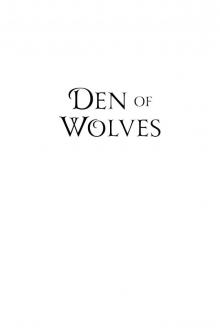 Den of Wolves
Den of Wolves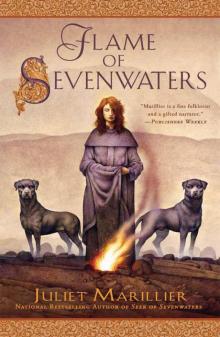 Flame of Sevenwaters
Flame of Sevenwaters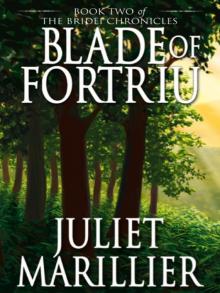 Blade of Fortriu
Blade of Fortriu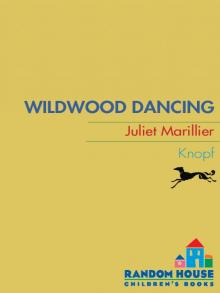 Wildwood Dancing
Wildwood Dancing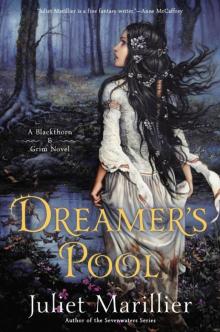 Dreamer's Pool
Dreamer's Pool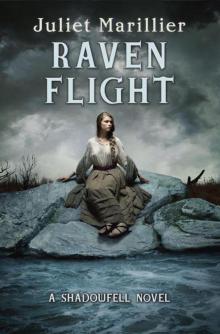 Raven Flight
Raven Flight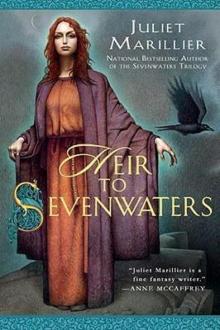 Heir to Sevenwaters
Heir to Sevenwaters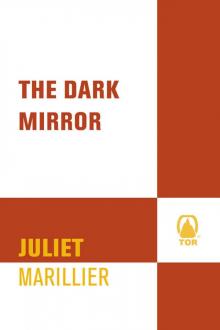 The Dark Mirror
The Dark Mirror Daughter of the Forest
Daughter of the Forest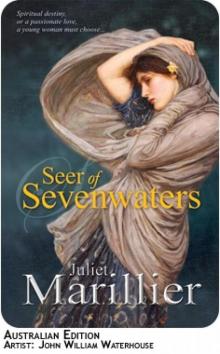 Seer of Sevenwaters
Seer of Sevenwaters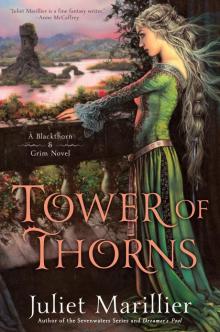 Tower of Thorns
Tower of Thorns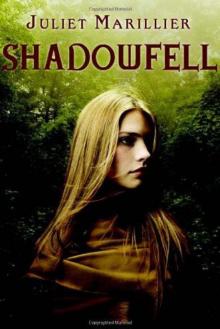 Shadowfell
Shadowfell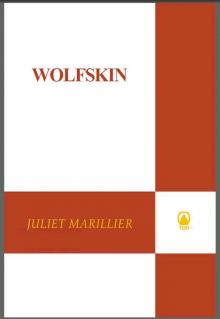 Wolfskin
Wolfskin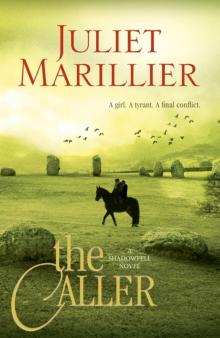 The Caller
The Caller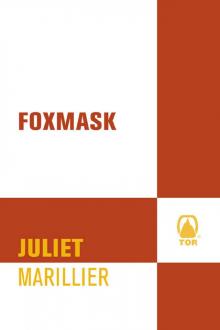 Foxmask
Foxmask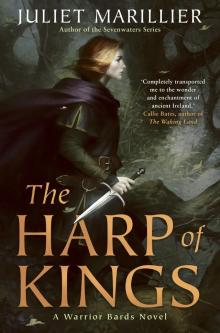 Harp of Kings
Harp of Kings The Well of Shades
The Well of Shades Heart's Blood
Heart's Blood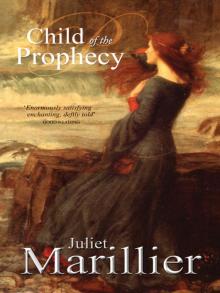 Child of the Prophecy
Child of the Prophecy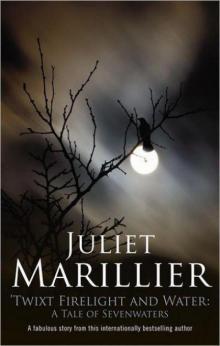 Twixt Firelight and Water
Twixt Firelight and Water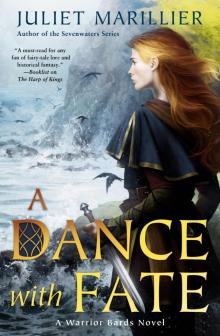 A Dance with Fate
A Dance with Fate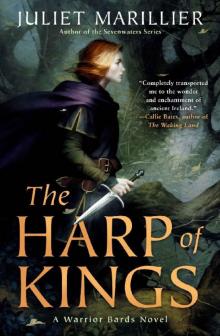 The Harp of Kings (Warrior Bards)
The Harp of Kings (Warrior Bards)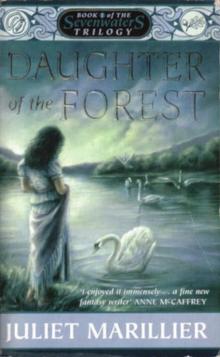 Daughter of the Forest (The Sevenwaters Trilogy)
Daughter of the Forest (The Sevenwaters Trilogy)![Sevenwaters [06] Flame of Sevenwaters Read online](http://i1.bookreadfree.com/i2/04/08/sevenwaters_06_flame_of_sevenwaters_preview.jpg) Sevenwaters [06] Flame of Sevenwaters
Sevenwaters [06] Flame of Sevenwaters![[Sevenwaters 04] Heir to Sevenwaters Read online](http://i1.bookreadfree.com/i2/04/12/sevenwaters_04_heir_to_sevenwaters_preview.jpg) [Sevenwaters 04] Heir to Sevenwaters
[Sevenwaters 04] Heir to Sevenwaters